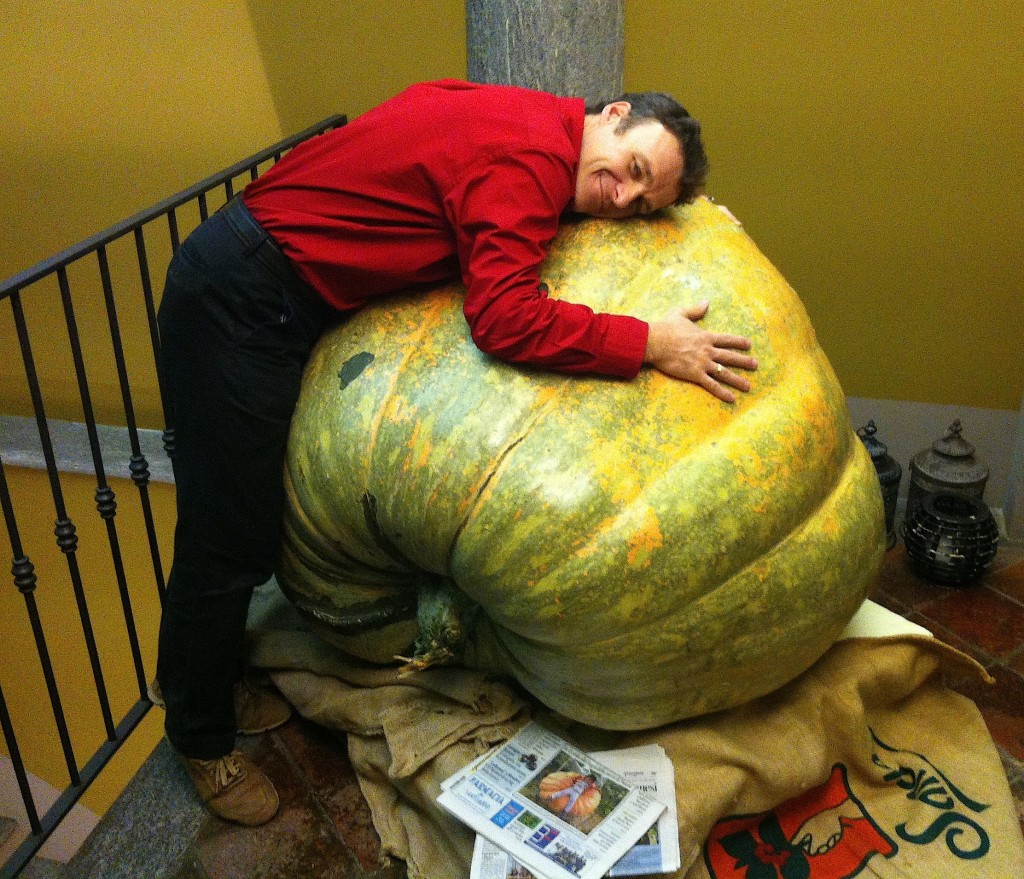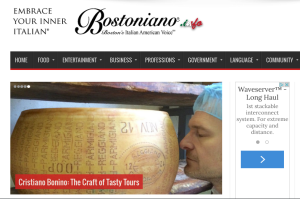 Cristiano Bonino organizes food tours for a living: yet, as a foodie, he is not very credible – at least not at first glance.
Cristiano Bonino organizes food tours for a living: yet, as a foodie, he is not very credible – at least not at first glance.
At 45, the shape he is in is associated with enthusiasts of diets and gyms, not gourmet regional specialties — especially after living in America on and off for the past 8 years (full time for the last four). As he leads me up the stairs to his Somerville top floor apartment it is hard for me to keep up with him; then as soon as we reach the kitchen/living-room – a sunlit open space nicely furnished with as much wood and as little plastic as possible – he tells me about how he sprained his ankle while running.
“Learning is my drug, I am hooked on it,” he begins, almost anticipating my first question. “When I take a group of tourists to Italy, more often than not, I discover the place with them. Of course, I know where we are going and who the local food producers and artisans we meet are, yet every time it’s like a new adventure, and there are always new people and therefore new stories for me to learn. Even through simple recipes … you know, edible stories!
“For example, have you had pasta made with ‘grano arso’? (burned wheat); as unappealing as it might sound, it is delicious!”
His eyes wander about, his mind is in Basilicata, where he first learned about this ancient specialty, triggered – like many Italian delicacies – by sheer and mere need. I am there with him… and hungry already!
“It’s darkish, almost like the spinach-enriched kind … it comes from the fact poor people used to pick up the wheat left on the field after the harvest and the cleanup which, in those days, was done by burning the stubbles, and used it to make flour. Nowadays the wheat is oven-toasted, of course, but the flavor is just as intense. I couldn’t believe it when they first told me .. it blew my mind .. both the story, and the flavor!”
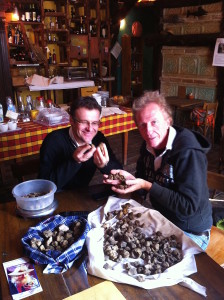 As he speaks, the aroma of freshly brewed espresso fills the room; he serves it to me, on a thick, featherweight, oddly uneven tray: “This is made of pure cork from Sardinia,” he explains, “you know, from the same rural inland area where the shepherds make ‘Porceddu,’ a piglet slowly cooked in a hole in the ground with ashes.”
As he speaks, the aroma of freshly brewed espresso fills the room; he serves it to me, on a thick, featherweight, oddly uneven tray: “This is made of pure cork from Sardinia,” he explains, “you know, from the same rural inland area where the shepherds make ‘Porceddu,’ a piglet slowly cooked in a hole in the ground with ashes.”
His eyes start wandering again while he moves quickly and — voilà! — a giant blueberry muffin appears on the same cork tray (oh, yeah!) … it is truly one of the most fragrant pieces of pastry I have had in a long time; as I dive in it, Bonino tells me about the lady that makes it, in a little bakery down the street, where lines form during the weekend … and, as distracted as I am by the instant sugar high, I realize his explorer’s attitude is not only limited to his trips as a tour guide in his native, beloved, country, but it is truly Cristiano’s way of life. That’s why he could not have chosen a better name for his company: “food, stories, travel.”
It wasn’t always like this for Bonino.
His working life began as a financial advisor. In fact, his previous life has absolutely nothing to do with his current one: his career as tour operator was triggered by his longtime hobby: cycling.
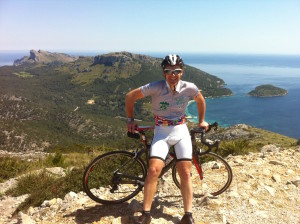 “I can still picture the key turning point in my life,” he recalls in a somewhat solemn way and with more than a hint of emotion in his voice. “It happened on top of Col dell’Agnello, in my native Piedmont, an 18-kilometer uphill where I cycled to with a group of fellow bikers to watch the ‘Giro d’Italia’ (Italy’s main bicycle race) go by. Among the many bikers there for the occasion I spotted a group of Americans who included cycling celebrity ‘sighting’ in their tour of Italy. I asked their tour guide, also on a bike, about it and I remember going home thinking: That’s what I want to do!”
“I can still picture the key turning point in my life,” he recalls in a somewhat solemn way and with more than a hint of emotion in his voice. “It happened on top of Col dell’Agnello, in my native Piedmont, an 18-kilometer uphill where I cycled to with a group of fellow bikers to watch the ‘Giro d’Italia’ (Italy’s main bicycle race) go by. Among the many bikers there for the occasion I spotted a group of Americans who included cycling celebrity ‘sighting’ in their tour of Italy. I asked their tour guide, also on a bike, about it and I remember going home thinking: That’s what I want to do!”
And that’s exactly what Bonino did: he contacted the company, “Ciclismo Classico,” (still a point of reference for Italian bike tourism in the Boston area) and became one of their guides – first, as a freelance, during his vacations, then increasingly often, until he finally left his job (“My mother almost beat me up … physically,” he recalls with a laugh) moved to America, and started working for them full-time. After 90 tours through 10 different Italian regions, with over 1,400 ‘customers on wheels’ on his resume and a myriad Italian ‘agriturismo’ owners, food producers and artisans on his rolodex, he took a leap into self-employment and, in fact – off the bike.
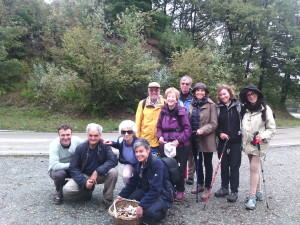 “Now I mostly travel around with a van, (although with bike tours still available upon request), which I personally drive, ideally with groups made of maximum 8-10 people: itineraries vary, from very specific ones (like the mushroom tour we recently took with guests from Boston mycology enthusiasts) to others I tailor to the needs and preferences of customers: if they come to me with just a generic desire to go to Italy, I first try to find out, through a very detailed questionnaire, what they are into, and most importantly what they are about. In the majority of cases they are professionals in their 50s, 60s, and 70s who share a great passion for Italy, without any particular family or heritage affiliation. In other words, only a small percentage are Italian-Americans: they are just fascinated by our country, its food, its way of life; and after they visit it once, all they want to do is return, over and over again … oh if only Italians in Italy would know how much their country is appreciated!”
“Now I mostly travel around with a van, (although with bike tours still available upon request), which I personally drive, ideally with groups made of maximum 8-10 people: itineraries vary, from very specific ones (like the mushroom tour we recently took with guests from Boston mycology enthusiasts) to others I tailor to the needs and preferences of customers: if they come to me with just a generic desire to go to Italy, I first try to find out, through a very detailed questionnaire, what they are into, and most importantly what they are about. In the majority of cases they are professionals in their 50s, 60s, and 70s who share a great passion for Italy, without any particular family or heritage affiliation. In other words, only a small percentage are Italian-Americans: they are just fascinated by our country, its food, its way of life; and after they visit it once, all they want to do is return, over and over again … oh if only Italians in Italy would know how much their country is appreciated!”
A mushroom tour in Italy.
As undoubtable as Americans’ fascination with Italy is, in the case of Bonino it also has to do with the passion he puts in touring it – if the way he talks about it in his living room is any indication, his tours must be intense, to say the least.
“You know, I don’t consider this an investment,” he concludes as he shows me a slide show of pictures, one crazier than the other in which he just falls short of making love to the foods he poses with. “Of course I want to make a good living out of it, but thinking of turning this into a franchise, making it big and eventually sell it, sounds like a nightmare. What I really want for my company to be is something that fills my life and the life of my customers.”
As the sugar high from the pint-sized muffin slowly fades away I find myself thinking : “Good thing this guy quit his former job: he is not even credible (and that, in my book, is a big compliment) as a businessman.”